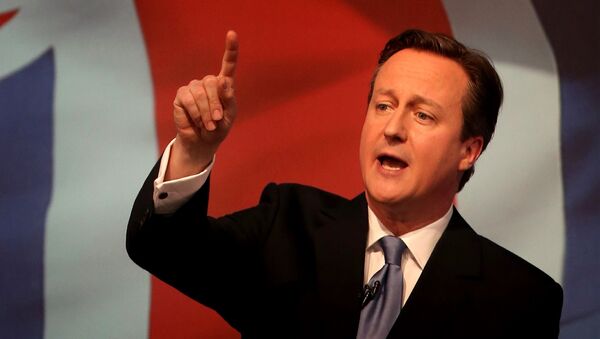Alongside increased economic risks stemming from the UK’s separation from the EU, the British PM sees reasonable political considerations, potentially undermining the credibility of the British financial sector, resulting in capital wipeout, and, subsequently, the decline in the sterling’s FX rate.
According to a draft of his speech to be delivered in Chester on Thursday, PM Cameron insists Britain would hardly recover quickly enough from the economic shock resulting from severing the ties with the world’s largest economic and political union, the EU.
“Let's just remember what a shock really means. It means pressure on the pound sterling,” the draft reads according to reports by the British media. “It means jobs being lost. It means mortgage rates might rise. It means businesses closing. It means hardworking people losing their livelihoods.”
The sterling dropped to its 7-year lowest at $1.42 in February, and is currently being traded at the lowest point of its 52-week average gauge of $1.42-$1.60.
Cameron believes currency risks are not a “price worth paying”, undermining London’s prominence as the world’s biggest financial hub and providing little in return, as the ongoing migrant crisis is likely a temporary challenge after all.
“Because there’s nothing more important than protecting people’s financial security. That’s why I believe we are better off in,” the draft of Cameron’s speech reads.
The Brexit debate is rife in Britain ahead of the referendum set for June 23, and whilst the ‘Out’ supporters believe the UK’s separation from the block would come in handy solving the problems posed to Britain by migration and Brussels’ bureaucratic inefficiency, Cameron advocates the longer-term benefits of Britain remaining in the EU.
Supporters of the ‘In’ campaign reiterate the tariffs-free access to the single market of over 500 mln consumers would be more beneficial for the British producers, even though the UK, unlike another European powerhouse economy, Germany, has been running a current account deficit for several consecutive years.
Recently, Bank of England (BoE) Governor Mark Carney expressed sentiment similar to Cameron’s in regard to the possible negative effects to the sterling’s exchange rate, having dubbed a potential Brexit ‘the biggest domestic risk to financial stability’.
An ongoing devaluation of the sterling would accelerate should the UK vote ‘Out’, pushing the currency even lower toward the $1.20-$1.29 trading gauge. A weaker pound would further impair the UK’s balance sheet situation as a net importer, unlike Japan or Germany, export-reliant economies, extracting greater benefits from weakening their currencies.
The currently massive inflows of foreign investment might decelerate or even dry out, depending on the power of impact the Brexit could deal to the credibility of the British financial institutions. The UK’s commercial banks would inevitably suffer in terms of earnings and overall performance, domestically and, more importantly, overseas.
On the other hand, further devaluation would spur inflation in the UK, thus brightening economic growth prospects, also allowing local industries to reorient towards domestic market, easing the nation’s dependence on imports. Yet, the ‘Out’ option seems to be a riskier option economically, explaining the Conservative British establishment’s urge to push their ‘In’ agenda.







